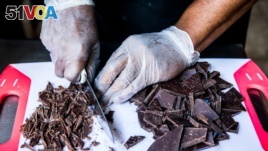29 December 2020
The island nation of Haiti is slowly developing its cocoa industry. Cocoa is the main element used to make chocolate.
The business is helping thousands of farmers earn better wages.
Haiti produces about 5,000 metric tons of cocoa each year. That is small compared to the 70,000 metric tons produced each year by neighboring Dominican Republic. But Haiti's development in the cocoa business is recent.

Preparation of a chocolate ganache with local rum by chocolate maker Ralph Leroy in the workshops of Makaya Chocolat on December 23, 2020 in Petionville, Haiti.
Feccano is a group of cocoa organizations in northern Haiti. It became the first group to organize exchanges in 2001 by making farmers' profits most important.
Guito Gilot is Feccano's commercial director. He said that in the past cocoa trees were destroyed because farmers did not consider the cocoa market profitable.
The group now works with more than 4,000 farmers in northern Haiti.
Feccano has been able to target the market for fine and sweet-smelling cocoa.
"Feccano's customers pay for quality: they don't have the New York Stock Exchange as a reference," Gilot said.
Haiti's private industries soon began investing in the cocoa industry, too. Until then, it had been supported only by non-governmental organizations and aid groups.
The company Produit des iles (PISA) entered the market in 2014.
Aline Etlicher directs research and development of new business at PISA.
"The producers we work with farm less than a hectare, often divided into several plots," she said, adding that "in Latin America, a small producer already owns four or five hectares."
Etlicher said the company buys cocoa the same day it is harvested. Farmers, then, no longer have to worry about drying and storing the cocoa to be sold to another business.
However, in recent months, collecting the cocoa has been difficult because many roads were often blocked because of social-political unrest.
Honoring organic and fair-trade approvals for the cocoa is tricky. But the Haitian style has made its mark internationally.
"With our customers, we are part of the 'bean to bar' movement of chocolate makers who transform the cocoa bean into the chocolate bar," Etlicher said.
She added that by not going through another company, Haitian producers have doubled the amount of money they make.
And processing of the cocoa beans remains local.
'Plant your cocoa'
Ralph Leroy lived for many years in Montreal, Canada before returning to Haiti as a high-end clothing designer.
His move to the cocoa industry began when he made clothes out of chocolate for a cooking trade show. He then trained for a year in Italy.
"The first week, I think I was insulted when the professor said, 'Chocolate is made for Europe. You there, plant your cocoa, we buy the cocoa and do the work,'" he remembered.
Today, Leroy runs Makaya, the chocolate company he founded in 2016. The tasty creations that come out of his workshop are very popular at parties. His company now has about 20 employees who share his love for chocolate.
I'm Jonathan Evans.
Jonathan Evans adapted this story for Learning English from an AFP report. Caty Weaver was the editor.
_______________________________________________________
Words in This Story
commercial – adj. related to or used in the buying and selling of goods and services
reference – n. the act of looking at or in something for information